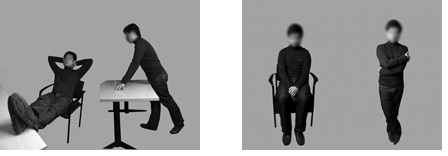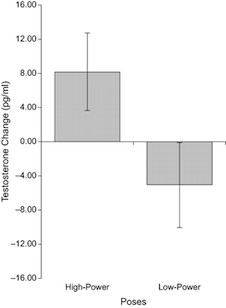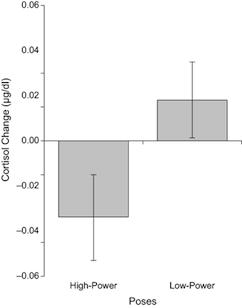October 8, 2010
How To Be Powerful, And Why You Are Not

she has assumed the position
Which guy appears more powerful? They guy with leaning back in a chair, feet up, hands behind his head? Or the guy hunched forward, hands together in his lap?

Which guy do you think feels more powerful?
The study found that assuming the 2 power positions (vs. non-power) for 1 min each had three results:
1. Subjects rated themselves as more powerful (2.84 vs. 1.87 on a 1 to 4 scale)
2. When offered a choice of keeping $2 versus betting it all on dice, 86% of the power group chose to gamble, vs. 60% of the non-power
3a. Their testosterone went up about 15% or down 10% from baseline, respectively:

3b. Power position also significantly lowered cortisol levels by about 15%, while adopting the low-power position had a limited, but upwards effect. Cortisol is usually secreted during acute stress.

All this, from two minutes of a posture change. True for men and women equally.
II.
In fact, the subjects weren't told to sit powerfully, they were told that they needed to sit like that to get a better EKG reading. So power itself was not suggested to the subject. It was merely the act of sitting in that way that made these changes.
This suggests that it was the posture itself that unconsciously(?) altered both self-perception and actual physiology. So, sit up straight.
But it's logical that if that posture unconsciously affects self-perception-- i.e. it wasn't a mechanical effect of having your hands above your head-- then that posture itself serves as the cue. So whether you see it, or position in it, it should have a similar effect.
So not only will sitting like that have an effect on you, but sitting like that will have an effect on whoever is looking at you.
It is a story best told about dating, and in reverse: if a woman sees you hunched over, she'll be biased towards assuming you're not "powerful", and you yourself will feel less powerful.
III.
This isn't anything new, it's long been known that forcing a physical maneuver can alter mood. Forced smiling can make you happier; clenching the fist makes men more aggressive and women feel less in control; method actors key off of physical movements to get their head in gear. And yoga exists.
It should also be obvious that this shouldn't work. How out of touch with our own bodies must we be if we can unconsciously change our mood by accidentally sitting a certain kind of way? And so how much does it therefore suck to be a computer geek hunched over a keyboard 13 hours a day? Time to do some push ups. (I do 40 every hour, between midnight and 2am; take that, guy who hates my physical bravado but is ok with my sexism, raging alcoholism and piracy.)
Some readers will come back with a notion of a mind-body feedback loop, fine, no argument from me; but if these principles are so well known, why don't people do them more often? Why, during a presentation, do some people still hunch over? Why do guys still timidly try to talk to a woman, instead of at least faking confidence and assertiveness? Or at least standing up straight?
IV.
Let's grant that the study is accurate. So if you're a young lad, adopting a powerful position improves your chances of "reproductive success" because she sees you as more powerful, and you feel more powerful, and you have more testosterone angering the blood. Check.
However:
Similarly, even though an presentation's chances for success are greater if you speak with confidence and stand up straight, doing it that way and failing is a greater blow to your ego.
Notice that the rejection is the same in both cases, but it is felt more severely if you act confidently, posture accordingly. There is more shame.
Thus, increasing your chances of failing is a defense against shame.
V.
That shame is the result of faking it, of putting on an identity that isn't really you (I'm powerful) and having it exposed (rejected.)
The solution is to not fake it. That doesn't mean not try, that means instead of sitting up straight before the presentation, sit up straight all the time. At least train your body to naturally adopt what your mind is too nervous/self-conscious to do.
If this study is at all representative of the truth, it means that eventually you will physically change into the person your body is pretending to be.
---
http://twitter.com/thelastpsych
II.
In fact, the subjects weren't told to sit powerfully, they were told that they needed to sit like that to get a better EKG reading. So power itself was not suggested to the subject. It was merely the act of sitting in that way that made these changes.
This suggests that it was the posture itself that unconsciously(?) altered both self-perception and actual physiology. So, sit up straight.
But it's logical that if that posture unconsciously affects self-perception-- i.e. it wasn't a mechanical effect of having your hands above your head-- then that posture itself serves as the cue. So whether you see it, or position in it, it should have a similar effect.
So not only will sitting like that have an effect on you, but sitting like that will have an effect on whoever is looking at you.
It is a story best told about dating, and in reverse: if a woman sees you hunched over, she'll be biased towards assuming you're not "powerful", and you yourself will feel less powerful.
III.
This isn't anything new, it's long been known that forcing a physical maneuver can alter mood. Forced smiling can make you happier; clenching the fist makes men more aggressive and women feel less in control; method actors key off of physical movements to get their head in gear. And yoga exists.
It should also be obvious that this shouldn't work. How out of touch with our own bodies must we be if we can unconsciously change our mood by accidentally sitting a certain kind of way? And so how much does it therefore suck to be a computer geek hunched over a keyboard 13 hours a day? Time to do some push ups. (I do 40 every hour, between midnight and 2am; take that, guy who hates my physical bravado but is ok with my sexism, raging alcoholism and piracy.)
Some readers will come back with a notion of a mind-body feedback loop, fine, no argument from me; but if these principles are so well known, why don't people do them more often? Why, during a presentation, do some people still hunch over? Why do guys still timidly try to talk to a woman, instead of at least faking confidence and assertiveness? Or at least standing up straight?
IV.
Let's grant that the study is accurate. So if you're a young lad, adopting a powerful position improves your chances of "reproductive success" because she sees you as more powerful, and you feel more powerful, and you have more testosterone angering the blood. Check.
However:
- if you consciously adopt a powerful state-- puff up your chest and say, "hey baby, nice stems", and it fails, you're going to look like an idiot. Shame.
- Your more natural, timid posture coupled with inevitable rejection is sad but not unexpected. There is less shame.
Similarly, even though an presentation's chances for success are greater if you speak with confidence and stand up straight, doing it that way and failing is a greater blow to your ego.
Notice that the rejection is the same in both cases, but it is felt more severely if you act confidently, posture accordingly. There is more shame.
Thus, increasing your chances of failing is a defense against shame.
V.
That shame is the result of faking it, of putting on an identity that isn't really you (I'm powerful) and having it exposed (rejected.)
The solution is to not fake it. That doesn't mean not try, that means instead of sitting up straight before the presentation, sit up straight all the time. At least train your body to naturally adopt what your mind is too nervous/self-conscious to do.
If this study is at all representative of the truth, it means that eventually you will physically change into the person your body is pretending to be.
---
http://twitter.com/thelastpsych
118 Comments